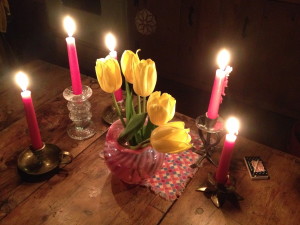
The woodstove that keeps heat in this cabin has changed into a sleeping bear. A match put to the teepee of crumpled newspaper and kindling offered an hour of warmth two mornings ago, and I approved. The flames were easily coaxed, miserly with woodpile leftovers, quickened by low humidity and higher temperatures. I went back to bed but then got up later to add in sticks of juniper, a woman in a white robe, hurrah! My silk long underwear are put aside at last.
The woodstove beginning its deep sleep is not a surprise. My Vermont Castings Resolute has doors that swing open for watching flame, and it has been gulping wood and burping heat, savored by all my cheeks through all the winter months, but now there it is next to my bill-paying desk, inert, deeply quiet, calm. A sturdy dragon breathing flame is changed to a dark box taking up floor space. A metallic churner of oak is put to sleep by longer daylight hours of full sun and a dimming of overnight freezing. (But of course, there might be snow in June …)
Yesterday after bringing a bunch of tulips home from the Fry’s grocery, I launched spring cleaning by sorting a desk drawer and then dusting and straightening shelves of journals. There I came across words by Rainer Maria Rilke inked on the back of a notebook. “It is spring again. The earth is like a child that knows poems by heart,” he wrote. (But where did he put these words? In letter, poem or essay? My magnet journals don’t always include the background of the sentences that catch my fancy. I copy words out just to see the gesticulations of the letter forms, I guess, to notice what sense looks like dancing to the tune of my own handwriting.) I read a few more of my pages from l998, I walked down to the mailbox with a letter, and then I put a roast in the crockpot, glad to think ahead to a window cracked open to evening light and a dinner at a table with candles and color instead of stove stoking.
As a poet relieved to feel hibernating in this cabin begins to ease, I spend the day writing but also put rugs on the porch railing and beat them, change out heavy blankets for lighter ones, and tenderly stroke the many small acts that are the web of householding. After a hot bath I lean over my toes examining each one as if they’d just grown out of my feet, just arrived in time for warm day walks with new green; oh the expeditions I’ll make soon to watch flowers waving arms, to pause with bird sounds looping through treetops. I consider painting each nail a different color so my feet might make rainbow footsteps through the lengthening days.
I feel permeable again.
My inside world stretches to embrace outside air. There is a pine three-drawer cabinet—a chipped bargain from IKEA—that needs staining. Maybe that can go on cardboard on the porch tomorrow. Two geraniums want potting. Irises tucked between rocks outside are beginning to do that bulge at the top of green brushstrokes that hints purple. What are those tiny birds that creep down the trees, faces exploring bark? Was that a cardinal’s shrill voice?
Oh, I know the winds are coming, planet air will do that vast inhale and exhale that is a less appealing part of spring glee. But here is the poem I’ll memorize because it comforts me, it teaches me, quite a lot for a mere five lines to do, but with spring exuberance, I give in to it, a tanka by Izumi Shikibu of 11th century Japan:
Although the wind
blows terribly here,
the moonlight also leaks
between the roof planks
of this ruined house.
- translated by Jane Hirshfield and Mariko Aratami from The Ink Dark Moon
It is not a child’s poem, not a song of festive carefree play. But I am not a child. I’ve had years of seeing how winter brooding arm wrestles with summer celebration. I know the glowing yellow of the five tulips on my kitchen table earned their grace and color from living through a time as bulbs in cold dark dirt. My living has taught me that. The sleepless hunched hour of the coldest night in winter will be barely remembered by a naked heart happy to greet a silky dawn in summer. A shelf full of journals shows me how I despaired and yet thrived through good and bad. What poem of my own did I write in that journal where I copied out Rilke, nearly 20 years ago? I invented these lines whimsically and then forgot them:
Flow, the stream chuckled,
(Though your head hurts, your knees buckle,)
Is not a hard thing. (Don’t listen to those suits!)
Balance, the cottonwoods whispered,
Is the dance of the green treetop with its dark roots.
What fun to savor my handwriting. I want to memorize more poems: Rilke’s poems, poems from other centuries, my poems. And I want to bend my ear to the dark and return wiser, able to smile at what I do and don’t understand. Poems teach me to be all-embracing. I want to keep learning that trust by heart. This spring as open doors mean the outdoors can be invited indoors to tea, I’m going to sip poems, go for walks and wake up again and again.

